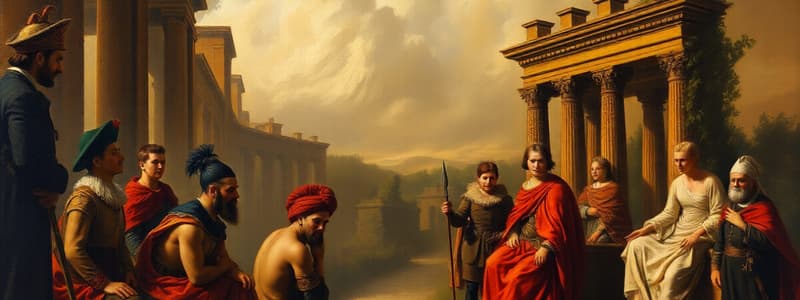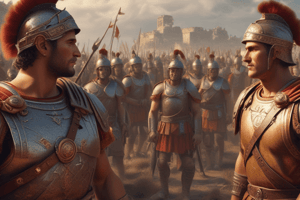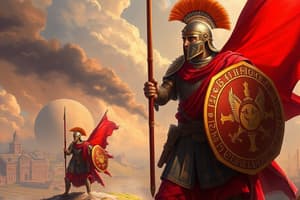Podcast
Questions and Answers
By the early 1st century C.E., Rome had become a mighty ______ that ruled the entire Mediterranean world.
By the early 1st century C.E., Rome had become a mighty ______ that ruled the entire Mediterranean world.
empire
The expansion of Roman power occurred over approximately five hundred years, from 509 B.C.E. to ______ C.E.
The expansion of Roman power occurred over approximately five hundred years, from 509 B.C.E. to ______ C.E.
14
At its height, the Roman Empire included most of Europe, North Africa, Egypt, and much of the present-day ______.
At its height, the Roman Empire included most of Europe, North Africa, Egypt, and much of the present-day ______.
Middle East
By 14 C.E., the republic was just a memory, and power was in the hands of a single supreme ______.
By 14 C.E., the republic was just a memory, and power was in the hands of a single supreme ______.
Some Romans even worshipped old emperors as ______, demonstrating their reverence and the emperors' power.
Some Romans even worshipped old emperors as ______, demonstrating their reverence and the emperors' power.
Flashcards are hidden until you start studying
Study Notes
Introduction to the Roman Empire
- Rome transitioned from a small republic in central Italy around 509 B.C.E. to a vast empire by 14 C.E.
- The empire controlled significant territories across Europe, North Africa, Egypt, the Middle East, and Asia Minor.
- Expansion of Roman power spanned approximately five centuries, characterized by military conquests and territorial defense.
Military Conquests and Defense
- Romans engaged in numerous wars to expand their territories and protect their holdings.
- The costs of military campaigns were substantial for both the Romans and conquered peoples.
Transformation of Governance
- In its early days, Rome was governed by a republic with elected leaders, fostering a sense of civic pride and participation.
- By 14 C.E., the republican system was replaced by an autocratic rule, with power consolidated in the hands of a single emperor.
- The concept of divinizing emperors emerged, reflecting their immense power and influence over society.
Historical Significance
- The evolution from republic to empire left a lasting legacy on governance structures, influencing political systems in various regions.
- The Roman experience serves as a historical case study in the dynamics of power, governance, and the costs associated with imperial expansion.
Studying That Suits You
Use AI to generate personalized quizzes and flashcards to suit your learning preferences.




